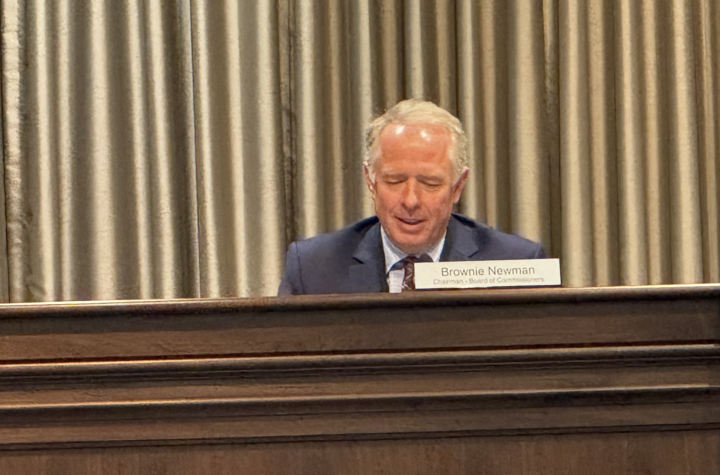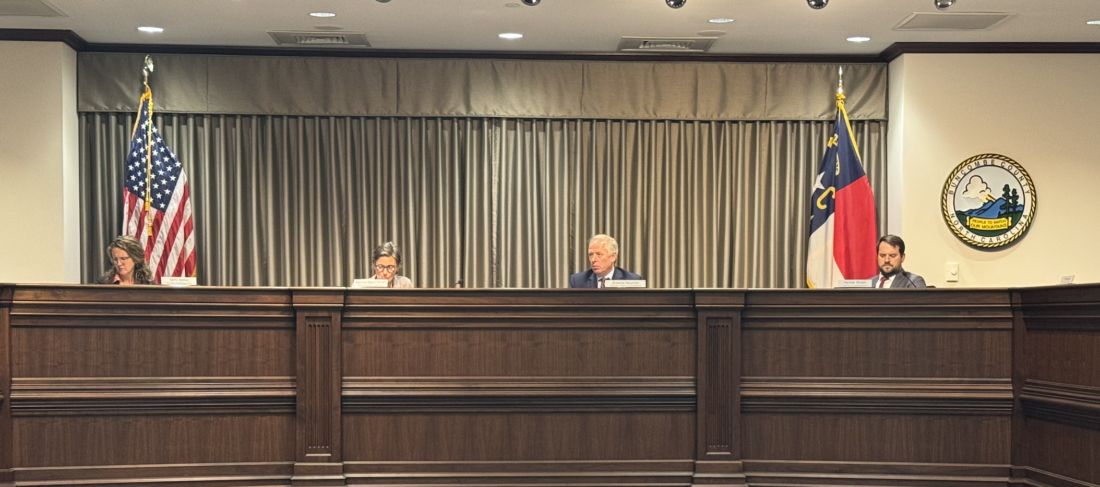Editor’s Note: This story was corrected June 17 to accurately reflect Commissioner Terri Wells’ comment on conservation spending. Previously, the quote was erroneously attributed to Commissioner Parker Sloan.
More than half of Warren Wilson College’s 1,100-acre campus is on its way to permanent preservation after the Buncombe County Board of Commissioners agreed to chip in county funds to make it happen.
Through four conservation easements, the Southern Appalachian Highlands Conservancy has helped acquire funding to conserve 600 acres of the largest remaining privately held tract of farmland and forestland in Buncombe County, said Jess Laggis, SAHC’s farmland protection director.
At its meeting June 4, the county board allocated $310,000 for the surveys, title searches and environmental assessments necessary to prepare for the land’s purchase as a conservation easement. The money comes from a special projects fund so the effort doesn’t require any general funds.
The Warren Wilson College board of trustees voted to partner with SAHC to establish the easements last month, according to a news release from the college.
“The Warren Wilson project is a phenomenal accomplishment. It’ll be looked at as one of the most significant conservation projects in the county’s history. I don’t think that’s overstating it at all. It’s one of those iconic places in the county just in terms of natural beauty and the working landscapes,” said Board Chair Brownie Newman before the vote.
The land includes scenic views, public hiking trails and portions of the Swannanoa River. Warren Wilson hosts a tailgate market and farm general store with products grown on the land, which acts as a living lab for the college. The trail system, which is all open to the public, also connects to county-owned Owen Park in Swannanoa.
The easements will cost $7.8 million in total, paid for with private dollars and state and federal grants, Laggis said. A $484,000 allocation from the county to complete the easements will be brought to commissioners at a future meeting
At the same meeting, commissioners unanimously approved spending $511,500 of 2022 general obligation conservation bond funds to purchase about 42 acres on Lower Brush Creek Road in Fletcher.
The Okoboji Farm property is an active hay and beef cattle farm in a conservation-focused area as identified in the county’s 2043 Comprehensive Plan, said Ariel Zijp, Buncombe’s farmland preservation manager. Cane Creek runs through the property, which is near the county’s southern border.
“Our community is going to reap the benefits of this for quite some time,” Commissioner Terri Wells said of the conservation spending.
Proposed tax hike clears public hearing
No one showed up to the public hearing June 4 to give their two cents about the county’s proposed 2.55-cent property tax increase in the 2024-25 budget, up for adoption in two weeks.
The $441.9 million general fund budget, if passed as proposed, would raise the tax rate to 52.35 cents per $100 of value. That means the owner of a home valued at $400,000 will pay $2,094 in taxes to the county, $102 more than last year.
Although the budget includes a 1% increase in expenditures of about $5.1 million, county Budget Director John Hudson called it a “continuation of services” spending plan.
If approved, the county would spend $3.7 million less than last year on operating county departments, Hudson said.
Conversely, the budget includes a $4 million funding increase for schools and an almost $2 million rise for both debt and retirement costs, Hudson said.
At the same time, revenues fell by $7.6 million this year because of fewer sales tax receipts and reductions in intergovernmental revenue, he added.
Commissioners will hold a final vote on the budget at their next meeting Tuesday, June 18.
Commissioners defer vote on capital improvement policy

During budget discussions over the last few months, commissioners expressed interest in adopting a formal policy for how and when it would address capital improvement needs for county properties. After a staff presentation June 4, they tabled a vote on the matter, requesting more flexibility be worked into the policy.
Currently, the county has an informal five-year outlook. Finance Director Melissa Moore recommended the county extend that to seven years and include a process for how commissioners can amend the capital improvement plan.
The policy would establish an ongoing transfer of money to a capital reserve fund, which would grow based on interest rates, therefore lessening the county’s reliance on financing and saving money in the long run, Moore said.
The reserve fund would be seeded by a transfer equal to 120% of the county’s general fund debt service obligation in fiscal year 2025-26.
Newman questioned whether that would allow future commissioners adequate flexibility to move money around if they were facing a tight budget year.
“This year is probably the hardest budget year … that I’ve faced since I’ve been on the County Commission,” he said.
“I just question whether it makes sense for the county to kind of commit itself to this kind of specific policy, as opposed to, when we get into these future budget years, look at what the capital project needs are [to determine what to fund].”
Commissioner Al Whitesides said he would rather have a stated policy, with an established pool of money to be better prepared in the future.
“If we put this in place 10 years ago, would we be having the problems we’re having today?” he asked.
Future commissioners could always choose to allocate capital funds differently if circumstances dictated, he added.
Considering the tight budget year the county is facing, Commissioner Amanda Edwards said this might not be the best time to pass the new plan, even though it wouldn’t go into effect until 2025-26.
Commissioners will have another chance to review the policy after staff adds language allowing for more flexibility.




Before you comment
The comments section is here to provide a platform for civil dialogue on the issues we face together as a local community. Xpress is committed to offering this platform for all voices, but when the tone of the discussion gets nasty or strays off topic, we believe many people choose not to participate. Xpress editors are determined to moderate comments to ensure a constructive interchange is maintained. All comments judged not to be in keeping with the spirit of civil discourse will be removed and repeat violators will be banned. See here for our terms of service. Thank you for being part of this effort to promote respectful discussion.